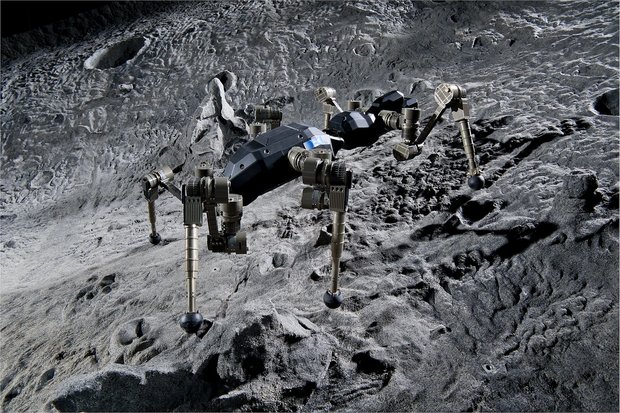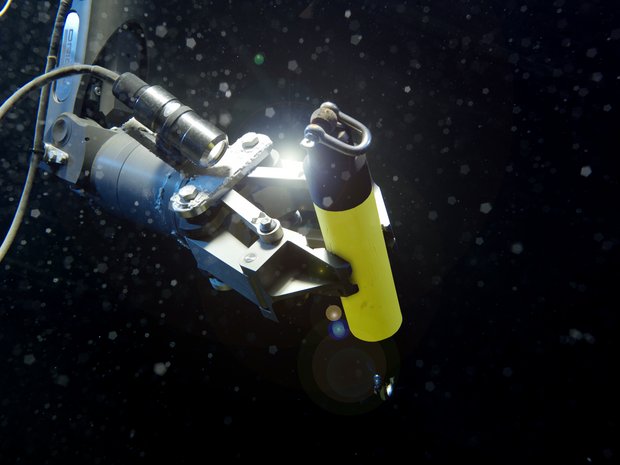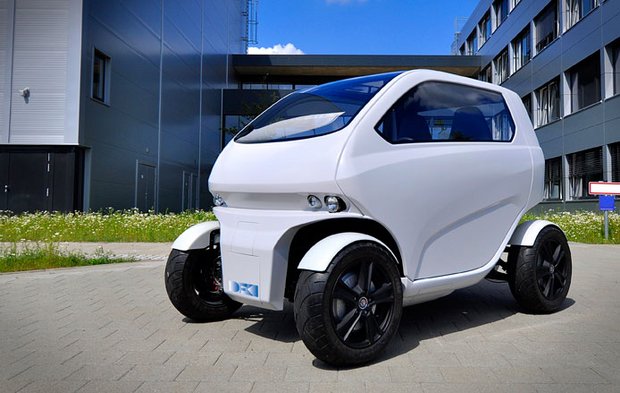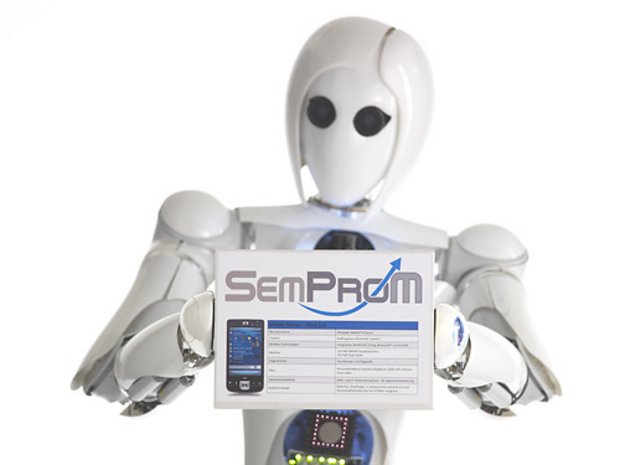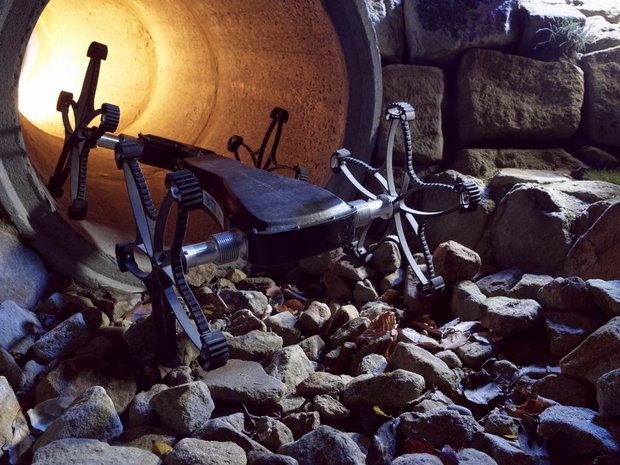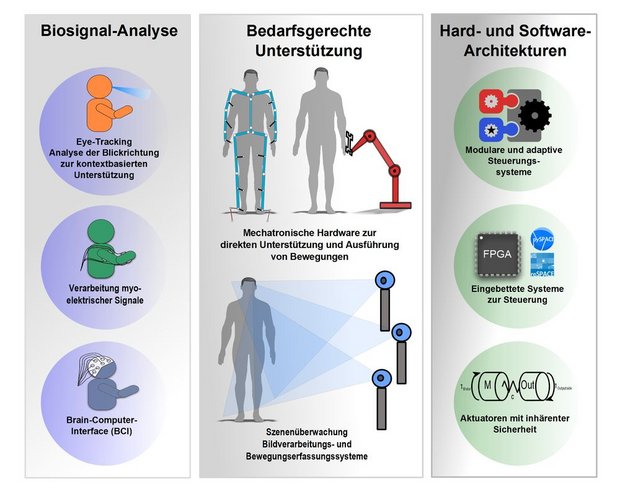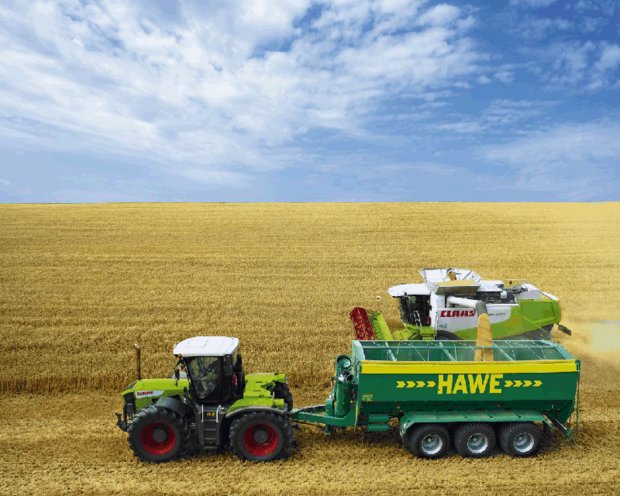Space Robotics
The research area Space Robotics deals with the development of intelligent robots for extraterrestrial exploration focusing on:
- Development of robot systems for unstructured, uneven terrain based on biologically inspired innovative locomotion concepts
- Development of multi-functional robot teams usable for different tasks ranging from in-situ examinations to the organisation and maintenance of infrastructure
- Reconfigurable systems for planetary exploration
- AI-based methods for autonomous navigation and mission planning in unknown terrain
- Image evaluation, object recognition and terrain modelling
- AI-based support systems for scientific experiments
Underwater Robotics
This area deals with the development and realization of Artificial Intelligence methods in underwater systems. Main points of research are:
- Development of systems for user support in remote-controlled underwater vehicles employing virtual immersion methods
- Design of methods for autonomous manipulation and mission planning of robot arms in underwater applications, particularly with state-of-the-art sensor technology, such as "Visual Servoing"
- Image evaluation and object recognition with modular and intelligent underwater cameras
- Design of control methods for next-generation autonomous underwater vehicles
- Development of biologically inspired and energy-efficient methods of transport for underwater vehicles, such as oscillating systems
Electric Mobility
In the field of electric mobility we are testing concepts for electric vehicles, battery charge technologies, and the collection of vehicle data. We are creating models for intelligent, environmentally sound, and integrated urban mobility. Our research focuses around:
- Development and demonstration of innovative vehicle concepts
- Design of new approaches to mobility and traffic control, application support, technology integration
- Data collection by fleet tests with technologically different electric vehicles
- Coordination of the regional project office of the model region Electric Mobility Bremen/Oldenburg
- Virtualization of the model region, simulation of future, larger vehicle fleets, and predictions of the effects on the model region in terms of traffic volume, infrastructure needs, environmental pollution, and economic efficiency
- Creating a foundation for new business models and traffic concepts on the basis of the data previously collected
Logistics, Production and Consumer (LPC)
In this area, robots are developed to act autonomously and/or support humans in intralogistic, industrial and consumer scenarios. Our research focuses around the new robotics for the Industrie 4.0 and beyond:
- intelligent human-robot collaboration using hybrid teams for production environments
- development of cognitively enhanced robot capabilities for flexible manufacturing
- modular, novel and safe robots for human-robot collaboration
- autonomous mobile manipulation for intralogistics and manufacturing scenarios
- innovative robotics solutions for inspection (for instance, ballast water tanks, ship structures, or tunnel boring machines)
Search and Rescue (SAR) & Security Robotics
In this area, robots will be developed to support rescue and security personnel. Main points of our research are:
- Development of highly mobile platforms for indoor and outdoor applications
- Development of autonomous systems that are able to identify potential victims (SAR) or intruders (Security)
- Development and application of state-of-the-art sensor technology based on radar, laser scanner, and thermal vision to identify objects and persons, resp.
- Embedding of robot systems into existing rescue and security infrastructures
- Autonomous navigation and mission planning
Assistance- and Rehabilitation Systems
This field deals with robotic systems that can support humans in complex, exhausting or often repeated tasks. Application areas are both help during activites of everyday life (at home or work) and medical rehabilitation. Support can either take place using systems the human is wearing like
exoskeletons or orthoses, or by service robots performing the respective
task.
Core topics include:
- Concept development, design and construction
- intelligent hardware-system architectures
- software architectures
- embedded biosignal analysis, e.g. using information from:
- muscle (EMG)
- eye (eyetracking, EOG)
- or from brain activity (EEG)
- fusion of different sensors
- direct online signal processing (hard- and software)
- robust learning systems capable to adapt
- joint communication layers for better human-machine interaction
- (semi-)autonomously acting systems
- assist-as-needed
Agricultural Robotics
We develop robots for agricultural applications and transfer methods and algorithms from robotics to conventional agricultural machines. Our objective is to increase the performance of machines and processes and to reduce resource consumption at the same time. Our research is focused on technology applications used in the cultivation of land. Primary research topics are:
- Methods for autonomous planning and navigation of outdoor machinery
- Methods for environmental recognition in agricultural machinery control
- Methods of infield logistics to optimize cooperation and resource consumption between multiple agricultural machines
- Interoperability at the level of communication, processes and knowledge processing
